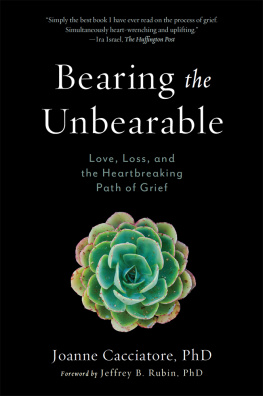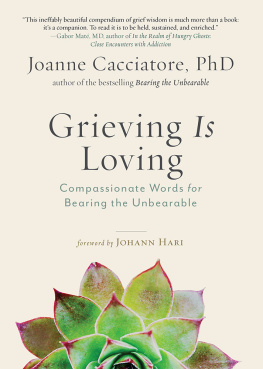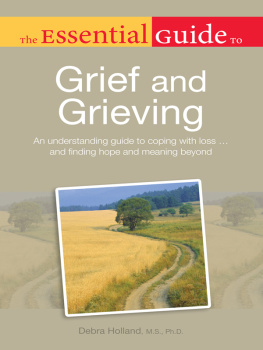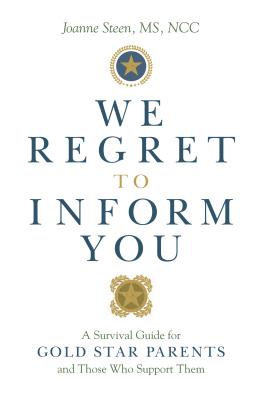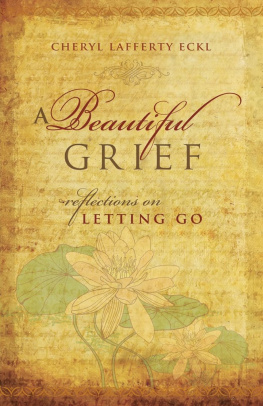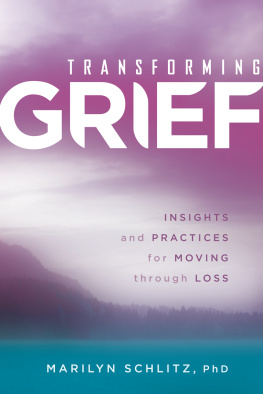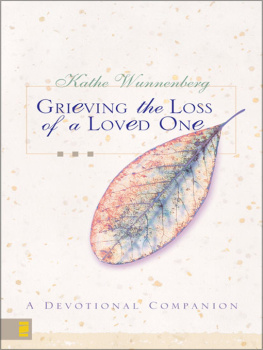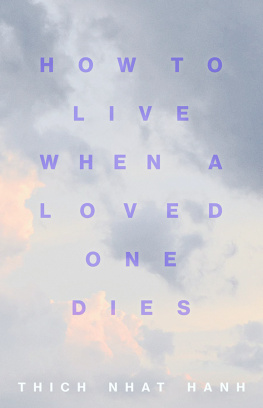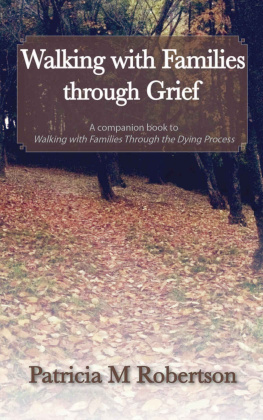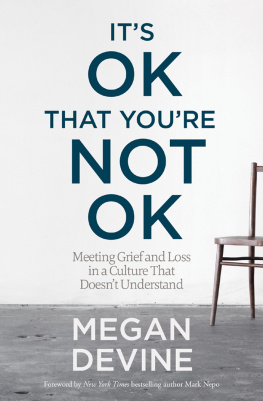MORE PRAISE FOR
Bearing the Unbearable
A truly remarkable book.
ROBERT D. STOLOROW, author of Trauma and Human Existence
An approach to grief that moves beyond platitudes and clich. It offers a way to truly grow through grief that is not a moving beyond but is more of an organic composting and recycling of the soul. It offers hope for those who feel like their loss has disconnected themselves forever from humanity and the circle of life. There is something for everyone in this garden that will restore and rejuvenate.
DOUG BREMNER, MD, professor of psychiatry at Emory University and author of The Goose That Laid the Golden Egg
Bearing the Unbearable is an experience more than a book. It shows us through its many emotionally gripping examples guaranteed to trigger readers own lurking tears much that is novel and illuminating about the ineffable depth and labyrinthine nature of intense grief.
JEROME WAKEFIELD, DSW, PHD, professor, NYU School of Medicine and author of The Loss of Sadness
An honest and courageous examination of the most common of human experiences. Dr. Cacciatores powerful book shows grieving human beings how to reclaim the process as normal and sacred, and how to insist on defining the process for themselves which leads to healing.
MARY NEAL VIETEN, PHD, ABPP, Executive Director, Warfighter Advance

A wise guide intimate, tender, and fierce reminding us what it means to fully love. This is a holy book, brimming with insight and compassion.
Francis Weller, author of The Wild Edge of Sorrow
There are sentences in this luminous book that took my breath away. Dr. Jo meets the broken-hearted where we live: in an utterly transformed and transformational space.
Mirabai Starr, author of Caravan of No Despair
This masterpiece is the greatest gift one could give to someone grieving or to the loved ones of the bereaved.
The Tattooed Buddha
If you love, you will grieve and nothing is more mysteriously central to becoming fully human.
W hen a loved one dies, the pain of loss can feel unbearable especially in the case of a traumatizing death that leaves us shouting, NO! with every fiber of our body. The process of grieving can feel wild and nonlinear and often lasts for much longer than other people, the nonbereaved, tell us it should.
Organized into fifty-two short chapters, Bearing the Unbearable is a companion for lifes most difficult times, revealing how grief can open our hearts to connection, compassion, and the very essence of our shared humanity. Dr. Joanne Cacciatore bereavement educator, researcher, Zen priest, and leading counselor in the field accompanies us along the heartbreaking path of love, loss, and grief. Through moving stories of her encounters with grief over decades of supporting individuals, families, and communities as well as her own experience with loss Cacciatore opens a space to process, integrate, and deeply honor our grief.
Poignant and heart-lifting. Bearing the Unbearable is for all those who have grieved, will grieve, or support others through bereavement.
Gabor Mat, MD, author of In the Realm of Hungry Ghosts
In eternal homage to our beloved dead.
And for all the mourners who have entrusted me
to be companion to them amid their utmost
uninhabitable hollows of grief.
For my four who walk
And for Cheyenne,
my one who soars:
Then, now, always, for kalpas.
Grief comes to one and all; no one is exempt.
We must remember our dead.
We must do better for the bereaved.
We must embody compassion.
To be redeemed we must remember.
Remembering is our duty
and the only thing that will save us.
List of Grieving Practices Mentioned
Foreword
BY JEFFREY B. RUBIN
We live in a precarious world in which loss and grief assail us at a seemingly ever-quickening pace.
In a culture like our own that is addicted to the relentless quest to feel happy perhaps as an unconscious attempt to bypass our disavowed misery grief is taboo, pathologized, and aggressively avoided. Grievers are advised to look on the bright side, think positive, and count your blessings. When such empty platitudes dont work basically always people who experience anguish may often be numbed with drugs. And this leaves victims of loss and grief guilty or shame-ridden about their sadness and without the resources to handle their pain. Whats crucial in trauma and what makes it bearable (as psychoanalyst Robert Stolorow usefully reminds us in Trauma and Human Existence) is having an emotional home for our feelings. Grief that is dismissed, suppressed, or silenced harms individuals, families, and communities. It leads, as Dr. Joanne Cacciatore aptly notes in this wonderful book, to addictions, abuse, and violence, often against the vulnerable: children, women, elderly, and animals.
In Bearing the Unbearable, Dr. Cacciatore, an associate professor at Arizona State University, an expert in traumatic loss and grief, a Zen priest, and herself a bereaved mother, shows us a healthier path. Drawing on more than two decades of clinical experience; research findings; the wisdom of Buddhist, Christian, Jewish, and Native American sages; and Western psychology, Dr. Cacciatore illuminates the emotional impact of grief and the psychological, relational, and spiritual elements of healing and transformation. This moving and insightful book is a superb counterweight to the mad rush in our grief-averse culture to deny negative feelings and anesthetize emotional anguish.
In poignant chapters on such topics as the cost of unrealized and unprocessed grief and trauma, transgenerational grief, guilt and shame, the relationship of loss and love, the practice of being with grief, and the value of rituals and micro-rituals, she clarifies not only the strategies individuals and the medical and psychiatric establishment use to deny, suppress, and anesthetize grief and mourning, but also the pathway to healing. Bearing the Unbearable offers a compelling critique of our compassion-deficient and happiness-addicted culture that creates a pathological relationship to our feelings in general and grief in particular. Dr. Cacciatore elucidates the cost of pathologizing grief and neglecting and invalidating the emotional experience of people who have suffered horrendous loss the way such approaches make the grief-stricken doubt themselves and feel alienated and isolated all of which precludes healing.
This book makes a plea for therapeutic approaches to trauma and grief that unflinchingly respect the full spectrum of feelings that human beings experience, thus providing an emotional home for our agony. Drawing on touching and sometimes heart-wrenching stories from her practice and her life, Dr. Joanne Cacciatore lovingly known to tens of thousands of grief-stricken people she has worked with on six continents as Jojo demonstrates what is necessary to facilitate healing. With searing honesty, inspiring courage, and exemplary empathy, Dr. Cacciatore greets the agony of her clients with patience and compassion and an intrepid spirit of curiosity and patience. And readers may feel themselves subtly transformed.
Bearing the Unbearable not only offers tales of remarkable healing; it is also an astonishing testament to the mysterious and transformational power of grief that is met with compassion to grow our heart, expand our circle of compassion, and generate lives of greater meaning. The traumatized live in a different psychological universe than the untraumatized. Ripped open by loss and grief, the former can also awake from the consensual trance of everyday life. Dr. Cacciatore elucidates two ways this can be transformative heightened gratitude and what she calls fierce compassion. No one is as capable of gratitude as one who has emerged from the kingdom of night, the late Elie Wiesel recognized. In Dr. Cacciatores book we are exposed to people who suffered traumatic grief and then teach us about expanded gratitude and service to others. Fierce compassion, which arises from fully experienced grief, helps us awake from our slumber and live more wholeheartedly. It helps us take more responsibility for reaching beyond ourselves and toward other people and the suffering that is haunting them. Dr. Cacciatore believes that it is a force that can heal the world.
Next page
